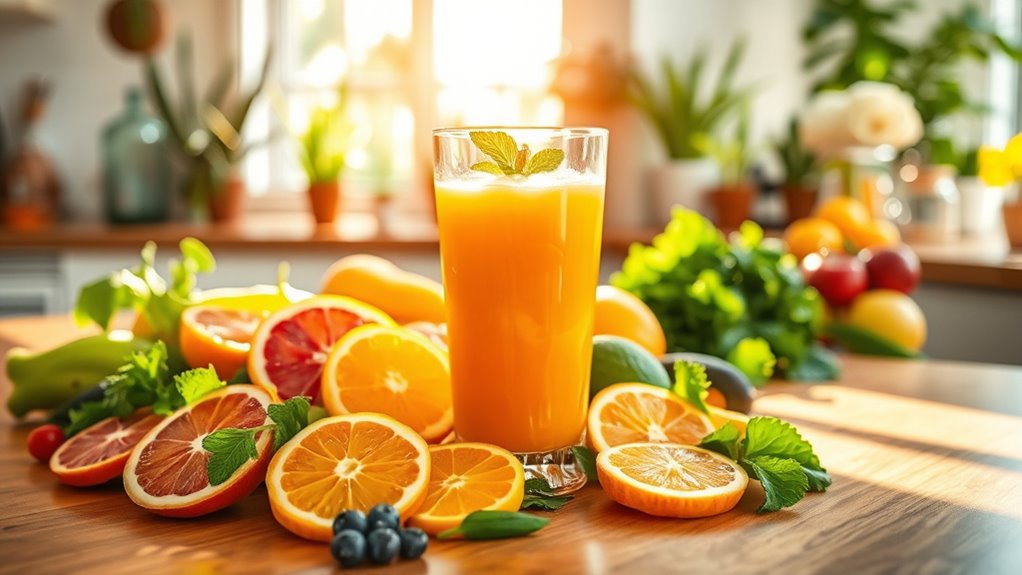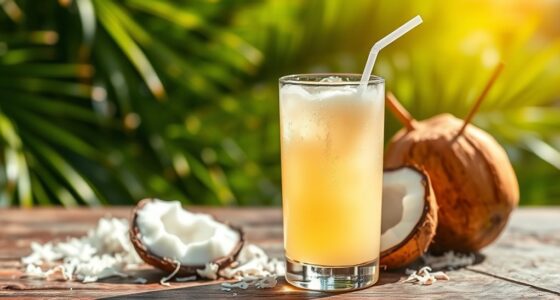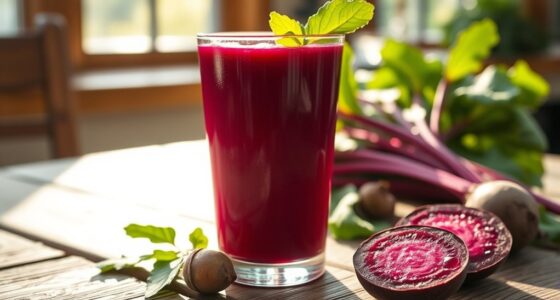You won’t believe how juicing can lower your stress levels! By incorporating nutrient-rich fruits and vegetables, you’re flooding your body with antioxidants and magnesium, which help regulate mood and reduce anxiety. Juices like Green Calm and Citrus Sunshine are packed with vitamins that combat oxidative stress, boost digestion, and enhance mental clarity. Many people, just like you, have transformed their mental well-being through juicing. Discover more surprising benefits and delicious recipes that’ll elevate your mood and health!
Key Takeaways
- Juicing incorporates nutrient-rich fruits and vegetables that lower cortisol levels, the stress hormone affecting mental health.
- Antioxidants in fresh juices combat oxidative stress, improving brain function and managing anxiety.
- Magnesium from leafy greens regulates brain function, helping to alleviate anxiety and depression symptoms.
- Delicious juicing recipes, like Green Calm Juice, provide concentrated sources of vitamins that support mental well-being.
- Personal stories highlight how individuals experienced reduced anxiety and enhanced mood through regular juicing.
The Power of Nutrients in Juicing
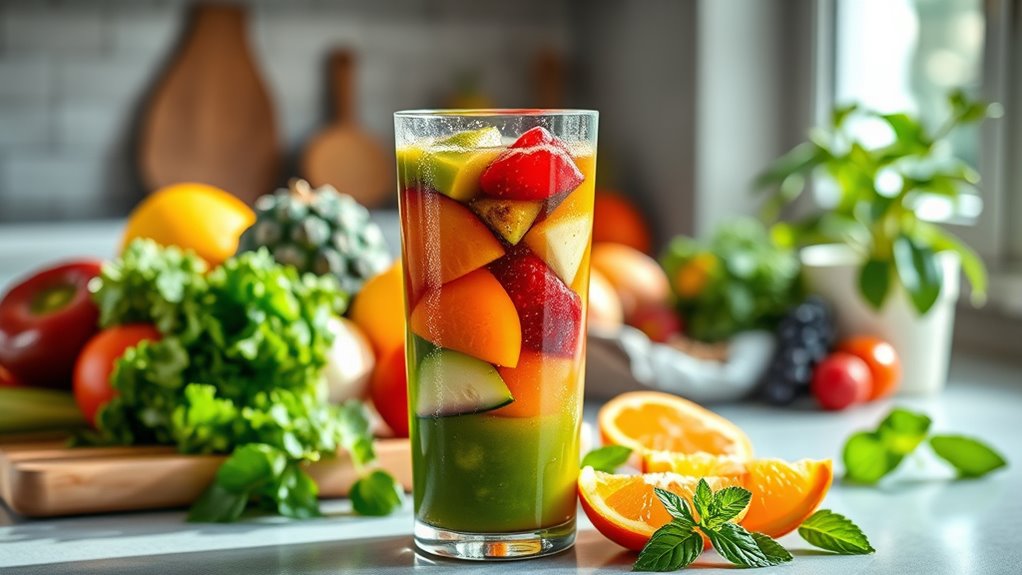
When you consider juicing for stress relief, it’s essential to recognize the power of nutrients packed into each glass.
Juicing offers a fantastic way to incorporate health-boosting, vitamin C rich fruits and fresh vegetables into your diet. These nutrients help lower cortisol levels, the stress hormone that impacts mental health.
Research shows that a diet rich in fruits and vegetables can greatly reduce anxiety and depression symptoms. Magnesium, often found in leafy greens, plays a vital role in mood regulation. Additionally, consuming green juice can enhance digestion and provide essential vitamins that support overall well-being.
Antioxidants and Their Role in Stress Relief
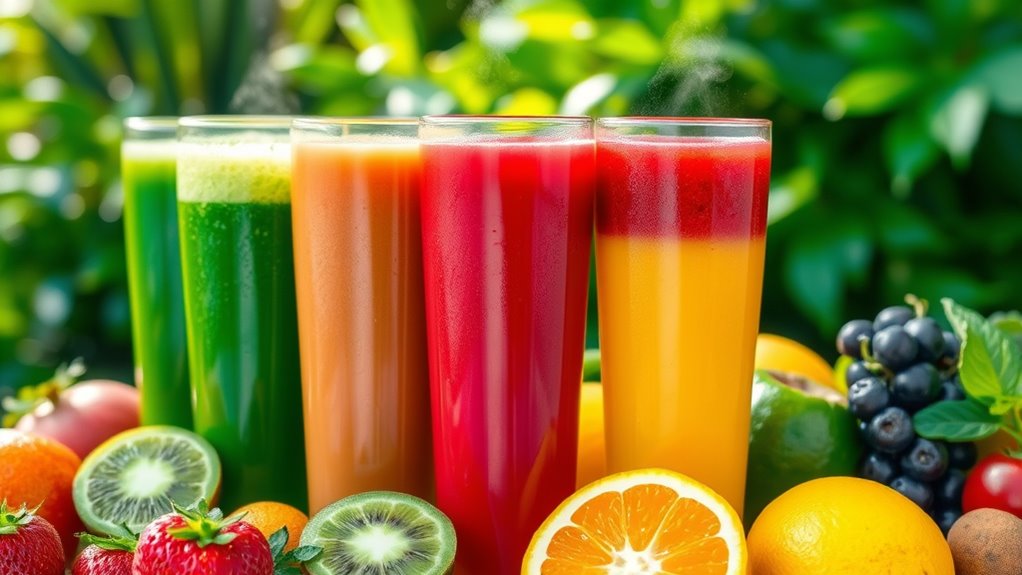
Antioxidants play an important role in managing stress by combating oxidative stress in the brain, which can contribute to anxiety and depression. By incorporating fresh juices rich in antioxidants, you can help manage cortisol levels and improve brain function. Juices made from fresh fruits provide crucial nutrients that lower levels of oxidative damage, promoting better mental health. Regular consumption of seeds like chia, which are rich in antioxidants, can further support your overall mental well-being.
| Antioxidant Source | Benefits |
|---|---|
| Vitamin C from Juices | Reduces cortisol levels |
| Flavonoids in Fruits | Enhances stress relief |
| Overall Antioxidants | Protects brain function |
A diet high in antioxidants is linked to lower rates of depression, making fresh juice a smart choice for your mental well-being.
Magnesium: A Key Player in Anxiety Management
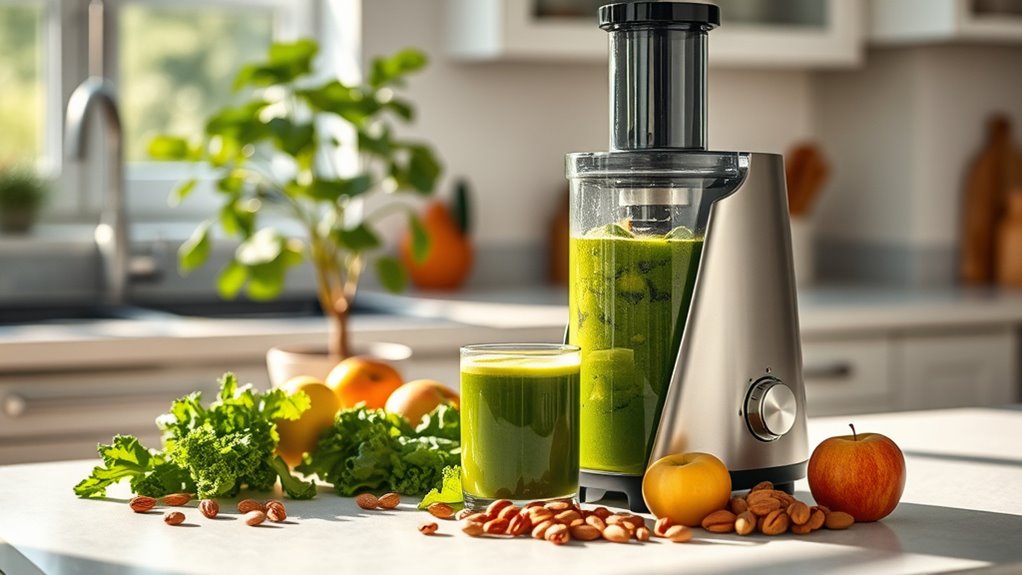
Magnesium acts as an essential ally in managing anxiety and supporting mental health. This important mineral plays a key role in regulating brain function and mood, with low magnesium diets linked to increased anxiety and depression symptoms.
By influencing key neurotransmitter systems, magnesium helps improve your body’s stress response. When magnesium levels drop, cortisol can spike, worsening feelings of anxiety.
Juicing fresh fruits and vegetables rich in magnesium, like spinach or kale, can greatly enhance your mental health. Incorporating these ingredients into your juicing recipes not only boosts magnesium intake but also helps stabilize stress levels. Additionally, juice cleansing can provide a concentrated source of vitamins and antioxidants that support overall wellness and mental clarity.
Delicious Juicing Recipes for Lowering Stress
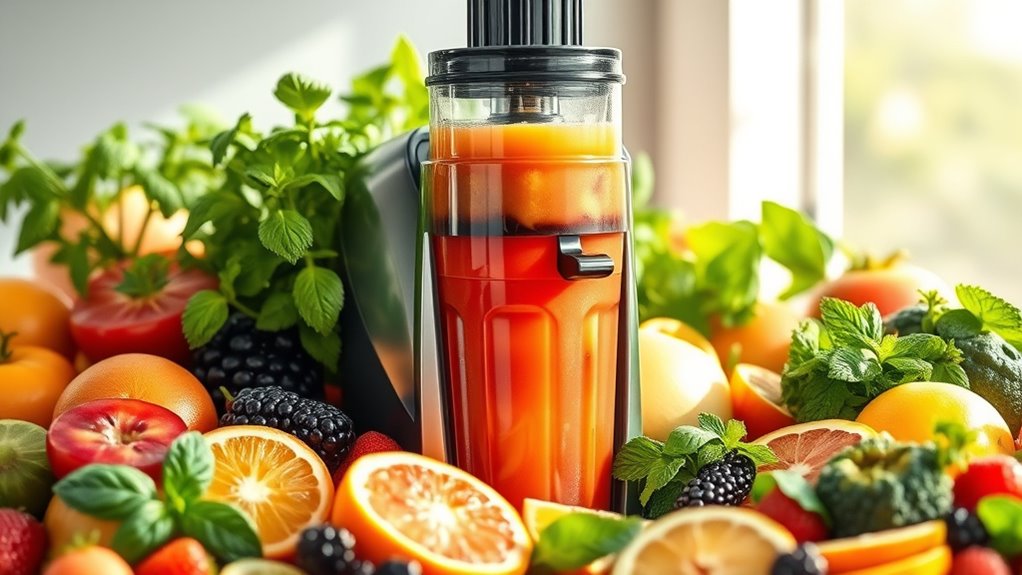
Juicing can be a delicious way to support your mental health and lower stress levels, especially when you choose the right ingredients.
Try the Green Calm Juice with spinach, cucumber, and green apple; it’s high in magnesium, which helps lower cortisol and stabilize blood sugar.
The Citrus Sunshine Juice blends oranges, carrots, and fresh turmeric for a revitalizing juice rich in vitamin C, known to combat stress effectively.
For a boost in circulation, the Beet Bliss Juice combines beets, strawberries, and ginger, mitigating symptoms of anxiety.
Don’t forget to mix in leafy greens and adaptogenic herbs like rosemary to enhance gut health and provide mood-boosting benefits, making your juicing for anxiety not just tasty but truly beneficial!
Personal Stories: Juicing and Mental Health Transformation

As you explore the transformative effects of juicing on mental health, many individuals have shared inspiring stories of how fresh juices have changed their lives. For instance, Perry and Mike found that juicing helped reduce their anxiety and stress levels. Linda experienced an energy boost and less anxiety after her first juice. Many emphasize the importance of B vitamins and antioxidants in these fresh fruits, which contribute to improved mood. Additionally, juices like beet juice can enhance blood flow and further support mental clarity and relaxation.
| Name | Juice Type | Benefit |
|---|---|---|
| Perry deLapouyade | Magnesium & C Juice | Reduced anxiety |
| Linda Rodriguez | Energy Boost Juice | Immediate energy boost |
| Denise L. | Antioxidant Juice | Enhanced mood & wellness |
These stories highlight juicing’s potential to greatly improve mental health.
Frequently Asked Questions
Does Juice Reduce Stress?
Juice can help reduce stress by providing essential nutrients that support your brain health.
By incorporating fruits and vegetables into your diet, you’re likely to experience lower levels of stress and anxiety.
Nutrients like vitamin C and magnesium found in juices can lower cortisol levels, which reduces your body’s stress response.
Plus, juicing allows for quick absorption of these nutrients, making it an efficient way to enhance your overall well-being and mood regulation.
What Do Doctors Say About Juicing?
Doctors say juicing can be a great way to boost your intake of essential nutrients like vitamins and minerals.
They emphasize that it might help manage stress and improve mental health when paired with a balanced diet.
However, they also caution that juicing shouldn’t replace whole fruits and vegetables, as these provide crucial fiber for digestion.
Always consult your healthcare professional before starting a juicing regimen, especially if you have specific health concerns.
What Is the 80/20 Rule for Juicing?
Imagine a vibrant glass filled with the rich greens of kale and spinach, mingling with the sweet blush of strawberries.
That’s the essence of the 80/20 rule for juicing: 80% veggies, 20% fruits. This balance packs your juice with essential nutrients while keeping sugar levels in check.
What Is One Downside About Juicing?
One downside about juicing is that it often removes essential fiber from fruits and vegetables. Without that fiber, you might feel less full, which could lead to increased hunger and overeating later.
Juices can also be high in sugars, especially if they’re fruit-heavy, causing spikes in your blood sugar levels. Relying solely on juice can create nutrient imbalances, making it important to balance your intake with whole foods for better health.
Conclusion
Juicing can be a game-changer for your stress levels. By packing your drinks with essential nutrients, you’re not just quenching your thirst but also nourishing your mind and body. With the right ingredients, like antioxidants and magnesium, you’re taking the bull by the horns when it comes to anxiety management. So why not give those delicious recipes a try? You might just find that a little juice goes a long way in transforming your mental health.
Cindy thoroughly researches juicing trends, techniques, and recipes to provide readers with practical advice and inspiration. Her writing style is accessible, engaging, and designed to make complex concepts easy to understand. Cindy’s dedication to promoting the advantages of juicing shines through her work, empowering readers to make positive changes in their lives through the simple act of juicing.

